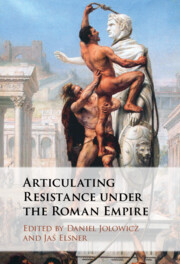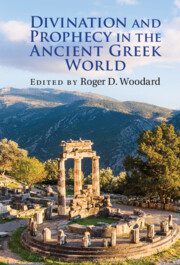Refine search
Actions for selected content:
23990 results in Ancient history
Abbreviations
-
- Book:
- Beyond the Monastery Walls
- Published online:
- 09 December 2022
- Print publication:
- 29 December 2022, pp xii-xiv
-
- Chapter
- Export citation
Main Index
-
- Book:
- Beyond the Monastery Walls
- Published online:
- 09 December 2022
- Print publication:
- 29 December 2022, pp 378-386
-
- Chapter
- Export citation

Articulating Resistance under the Roman Empire
-
- Published online:
- 23 December 2022
- Print publication:
- 05 January 2023

Rome and America
- Communities of Strangers, Spectacles of Belonging
-
- Published online:
- 22 December 2022
- Print publication:
- 05 January 2023

Divination and Prophecy in the Ancient Greek World
-
- Published online:
- 22 December 2022
- Print publication:
- 05 January 2023
Appendix 3 - The Boni in the Forum: Cicero’s Second Speech against Rullus
- from Appendices
-
- Book:
- The Roman Elite and the End of the Republic
- Published online:
- 15 December 2022
- Print publication:
- 22 December 2022, pp 298-304
-
- Chapter
- Export citation
Chapter 4 - Design, Commission, and Manufacture of Prostheses
-
- Book:
- Prosthetics and Assistive Technology in Ancient Greece and Rome
- Published online:
- 08 December 2022
- Print publication:
- 22 December 2022, pp 124-153
-
- Chapter
- Export citation
Chapter 14 - The Power of the Nobiles
- from Part III - The Boni and the End of the Republic
-
- Book:
- The Roman Elite and the End of the Republic
- Published online:
- 15 December 2022
- Print publication:
- 22 December 2022, pp 218-236
-
- Chapter
- Export citation
Part I - The Boni in the Late Republic
-
- Book:
- The Roman Elite and the End of the Republic
- Published online:
- 15 December 2022
- Print publication:
- 22 December 2022, pp 13-84
-
- Chapter
- Export citation
Copyright page
-
- Book:
- The Roman Elite and the End of the Republic
- Published online:
- 15 December 2022
- Print publication:
- 22 December 2022, pp iv-iv
-
- Chapter
- Export citation
Chapter 6 - Wealth and Morality Revisited
- from Part II - Property and Politics
-
- Book:
- The Roman Elite and the End of the Republic
- Published online:
- 15 December 2022
- Print publication:
- 22 December 2022, pp 87-94
-
- Chapter
- Export citation
Introduction
-
- Book:
- Prosthetics and Assistive Technology in Ancient Greece and Rome
- Published online:
- 08 December 2022
- Print publication:
- 22 December 2022, pp 1-39
-
- Chapter
- Export citation
Chapter 12 - ‘Egentes Sumptuosi Nobiles’
- from Part II - Property and Politics
-
- Book:
- The Roman Elite and the End of the Republic
- Published online:
- 15 December 2022
- Print publication:
- 22 December 2022, pp 177-198
-
- Chapter
- Export citation
Introduction
-
- Book:
- The Roman Elite and the End of the Republic
- Published online:
- 15 December 2022
- Print publication:
- 22 December 2022, pp 1-12
-
- Chapter
- Export citation
Chapter 2 - Boni et Locupletes
- from Part I - The Boni in the Late Republic
-
- Book:
- The Roman Elite and the End of the Republic
- Published online:
- 15 December 2022
- Print publication:
- 22 December 2022, pp 24-34
-
- Chapter
- Export citation
Chapter 17 - Epilogue
- from Part III - The Boni and the End of the Republic
-
- Book:
- The Roman Elite and the End of the Republic
- Published online:
- 15 December 2022
- Print publication:
- 22 December 2022, pp 283-289
-
- Chapter
- Export citation
Contents
-
- Book:
- The Roman Elite and the End of the Republic
- Published online:
- 15 December 2022
- Print publication:
- 22 December 2022, pp v-vi
-
- Chapter
- Export citation
Chapter 15 - ‘Boni Non Sequentur’
- from Part III - The Boni and the End of the Republic
-
- Book:
- The Roman Elite and the End of the Republic
- Published online:
- 15 December 2022
- Print publication:
- 22 December 2022, pp 237-268
-
- Chapter
- Export citation
Chapter 5 - Living Prostheses
-
- Book:
- Prosthetics and Assistive Technology in Ancient Greece and Rome
- Published online:
- 08 December 2022
- Print publication:
- 22 December 2022, pp 154-168
-
- Chapter
- Export citation
Part III - The Boni and the End of the Republic
-
- Book:
- The Roman Elite and the End of the Republic
- Published online:
- 15 December 2022
- Print publication:
- 22 December 2022, pp 199-289
-
- Chapter
- Export citation
